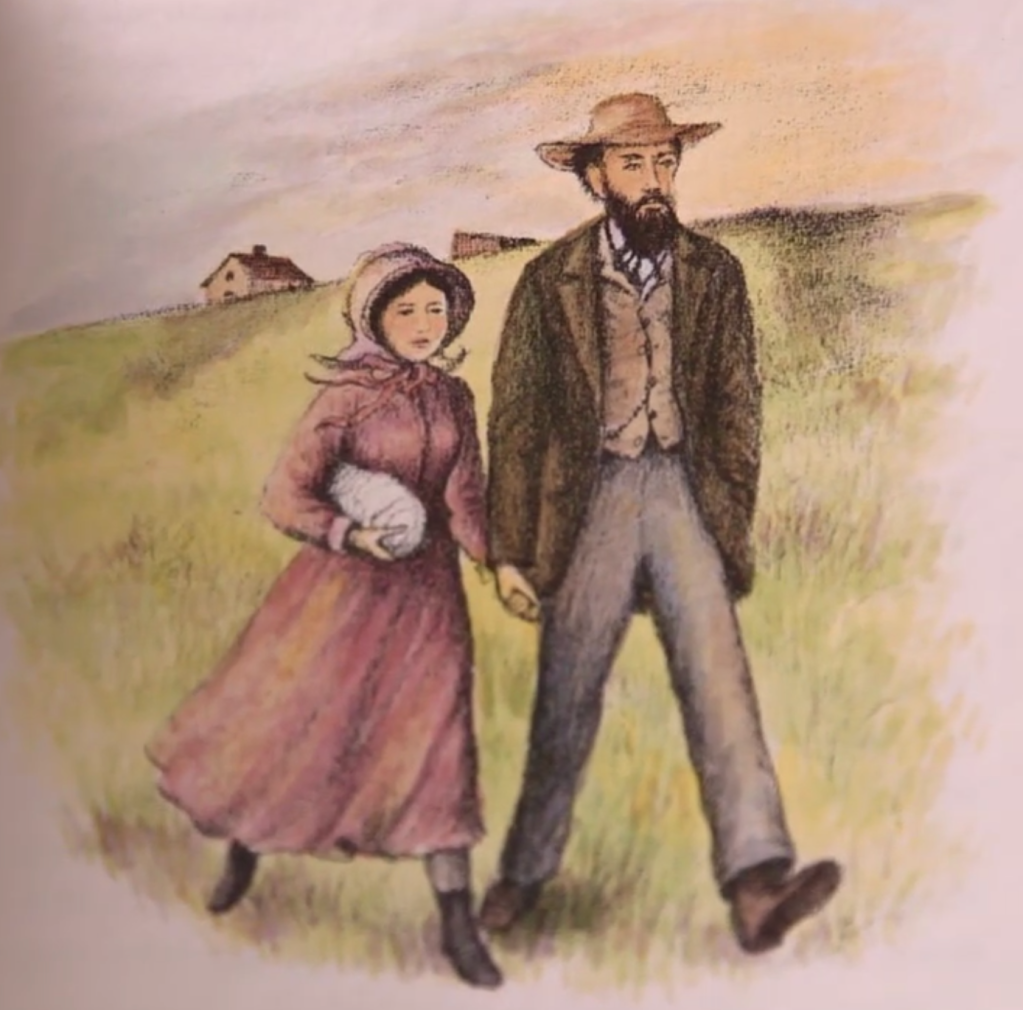I was eight when we moved to Sonora, CA. It was my fourth school in five years and I wasn’t adjusting well.
Luckily, our new town had a library tucked into the Veteran’s Hall, right on Main Street, between our house and our dad’s newspaper office.
And luckily, Mrs. Hoe was at the desk there, looking out for lonely readers. She handed me Little House in the Big Woods by Laura Ingalls Wilder, the story of a girl like me: same age and name, and quite attached to a warm and wonderful father. I loved reading how that other Laura found her way in her new place.
The book was a lifeline.

Not surprisingly, I was fascinated by the recent PBS show on American Masters, Laura Ingalls Wilder Prairie to Page. It begins by comparing Laura’s real childhood experiences to the Little House series’ stories, pointing out interesting discrepancies. As Laura said in her later years, “All I have told is the truth, but it is not the whole truth.”
But most interesting to me was to learn that the books were a collaboration between Laura and her daughter Rose Wilder Lane. Rose was an established author in her own right – penning magazine articles and fiction and non-fiction books – when she started working with her mother. Letters between Rose and Laura reveal how the Little House books were shaped by both women from conception to writing to editing.
The TV show uses examples from when they were working on the manuscript for By the Shores of Silver Lake. Rose’s letters are written on an old-fashioned typewriter. She has good advice about inhabiting the main character: “This is Laura’s story. You must stay inside Laura. Try always to make sight, scent, sensation immediate. ‘So Laura took the lines in her hands,’ is better than ‘So Laura drove the black ponies.’ Get it all directly as sight, emotion, thought, scent. Don’t say, ‘It reminded Laura of other times.’ Say, ‘This was like other times.’ Stay inside Laura.”
In another letter, Rose infers the collaboration did not always sit well with her mom. Rose wrote: “You are one of the few writers in the country who would turn down a collaboration with RWL – But go ahead! You certainly are handling the material much better all the time and if you don’t want this book touched, you are absolutely right to not have it touched.”
At issue? Rose advised against including the heartbreaking, true-to-life storyline about Mary going blind. Laura wrote back in her slanted scrawl on lined paper: “A touch of tragedy makes the story truer to life and showing the way we all took it illustrates the spirit of the times and the frontier.”
If you are a Little House fan, you will remember how Mary’s blindness is a poignant part of the book.
More from Rose to her mom: “As to similarity in our writing, of course. You often write lines and whole paragraphs that I feel are what I would have written or anyway I had. What you haven’t developed is structure, a kind of under-rhythm in the whole body of the writing, and a ‘pointing up’ here and there. English is an impressionistic language, an onomatopoeic language. It has a quality of a sunrise or a landscape, a meaning in feeling. Essentially, it is poetry.”
I love thinking of language as sunrise or landscape; as the atmosphere it creates.
The TV show says Rose denied any connection to the Little House books until her dying day. Apparently she did not want the act of writing for children to taint her adult publishing career. Her own best-known book is non-fiction: The Discovery of Freedom, an early work that laid the foundation for the Libertarian party.
The show includes a discussion of the issue of racial prejudice in the Little House books, noting Laura was the first recipient of the ALA’s Laura Ingalls Wilder Lifetime Achievement award in 1954. In 2018 the ALA changed the name of this award to the Children’s Literature Legacy Award in light of parts of the Little House books that are “dehumanizing to children of color and send damaging messages to white children.”
Lousie Erdrich characterizes the Little House books as “valorizing things that destroyed entire peoples in this country.” As an adult, I see that and am sickened. Still, when I am asked what books made a big difference in my childhood, Little House in the Big Woods belongs on the list. My adult self sees things differently, but my child self remembers walking into the library’s cool brick building on a hot September afternoon and finding Mrs. Hoe in her crisp white high-collared blouse, doing her best with the books at hand to offer a little bibliotherapy to a lonely kid.
For these past six years and three picture books, I have collaborated with my sister Kate McGee on illustration. I have benefited from the insights of a second brain and a second artistic sense to clarify each project, as well as Kate’s sense of color and innate good cheer. I hope Rose and Laura got some of that, too.
Note: The TV show is 90 minutes and covers lots, lots more. You can access it on demand.





















